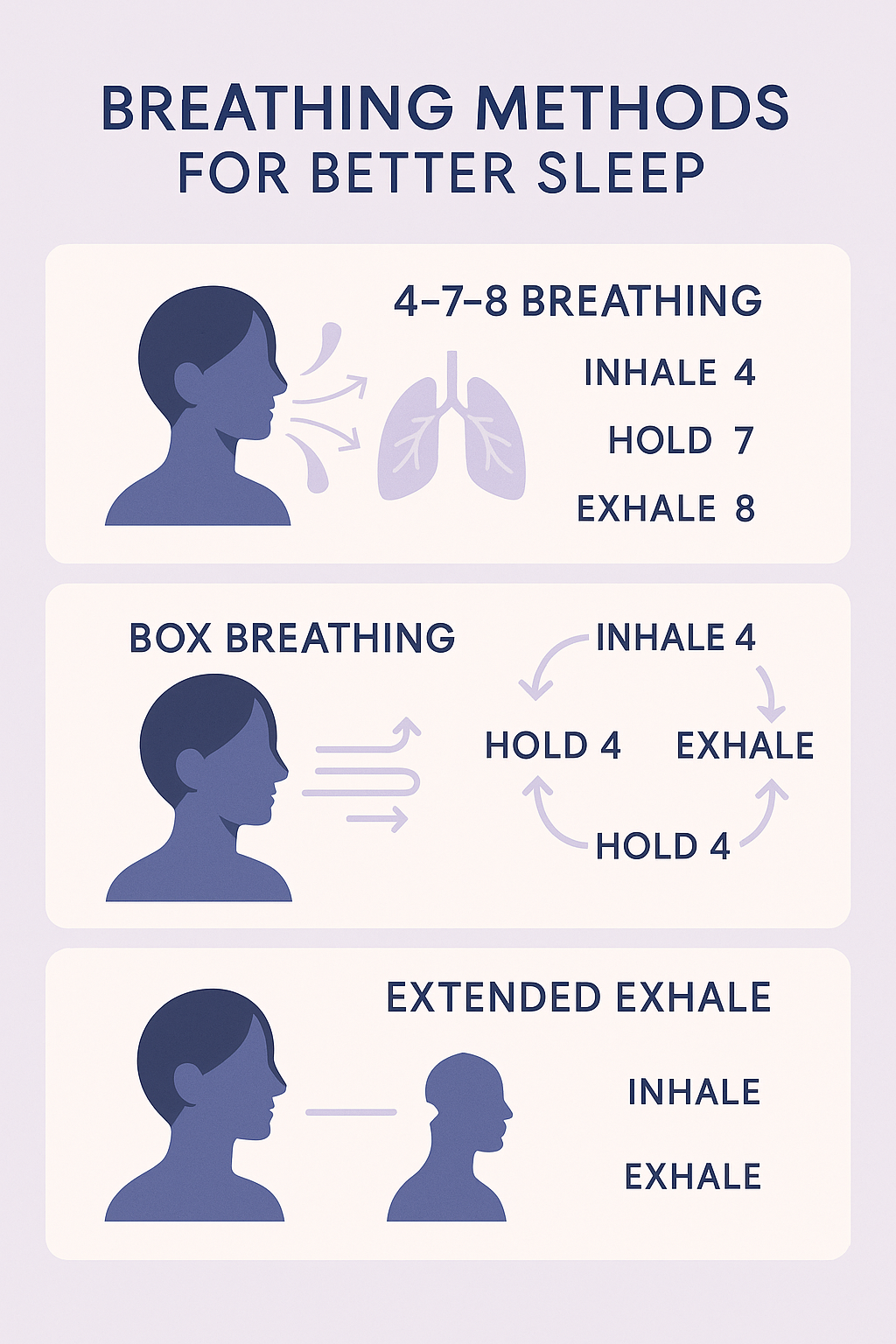Unlocking Tranquility: The Science of Sleep Meditation and Breathing Exercises
Published on June 28, 2025

Sleep Meditation and Breathing Exercises: A Natural Path to Restful Nights
In our fast-paced world, finding a moment of peace can be challenging, especially when it comes to winding down for a restful night's sleep. Sleep meditation and breathing exercises offer a gentle, natural way to ease into slumber, harnessing the power of mindfulness to calm the mind and body. Let’s explore not just the science, but also the wisdom of traditional practices that can enhance your nightly rest.
The Science of Sleep Meditation
Sleep meditation involves focusing the mind on calming thoughts or imagery, often guided by a soothing voice or music. This practice is rooted in mindfulness—being fully present in the moment without judgment.
Modern research confirms its benefits. Mindfulness meditation reduces stress and anxiety, two common culprits of sleep disturbances. Brain activity gradually shifts from beta waves (linked with active thinking) to alpha waves (relaxation). Heart rate slows, blood pressure decreases, and the body enters a state more conducive to sleep.
A well-known study in JAMA Internal Medicine showed that participants who practiced mindfulness meditation experienced better sleep quality and fewer insomnia symptoms compared to those who didn’t meditate.
The Power of Breathing Exercises
Breathing is a direct bridge between the mind and body. By slowing and deepening your breath, you activate the parasympathetic nervous system—the body’s "rest and digest" mode.
One of the most popular techniques is the 4-7-8 method: inhale for four counts, hold for seven, exhale for eight. This not only slows the heartbeat but also triggers a sense of safety and relaxation.
Other patterns, like box breathing (inhale 4 – hold 4 – exhale 4 – hold 4), are used even by athletes and military personnel to quickly calm the nervous system. Research confirms that controlled breathing can lower cortisol levels and improve overall sleep quality.
Wisdom from Traditional Chinese Medicine (TCM)
In TCM, sleep is seen as the interplay of Yin and Yang energies. To fall asleep, Yang (activity, heat) must retreat inward, and Yin (coolness, quiet) must be strong enough to hold it in balance.
Breathing practices help restore this equilibrium by anchoring the Shen (spirit) in the heart and calming the flow of Qi. For instance:
- Neiguan (PC6): Gentle pressure on this point, located on the inner wrist, calms the heart and eases anxiety.
- Shenmen (HT7): Found on the wrist crease, it nourishes the spirit and supports deep sleep.
- San Yin Jiao (SP6): On the inner leg, this point harmonizes spleen, liver, and kidney energies, which are central to peaceful rest.
Combining breathwork with light acupressure creates a holistic calming effect, aligning body and mind for restorative sleep.
👉 If you’d like to explore these techniques in more depth, download our free ebook Acupressure for Better Sleep, which offers step-by-step guidance with illustrations for the most effective points.
Creating a Ritual: Integrating Meditation and Breathing
For best results, make meditation and breathwork part of your bedtime ritual. Here’s a practical approach:
- Set the space: Dim the lights, silence notifications, and make your bedroom a sanctuary.
- Choose your practice: Guided meditation, silent body scan, or breathing exercises.
- Enhance with aromatherapy: Scents like lavender, sandalwood, or cedarwood can deepen relaxation (these are also recognized in TCM as calming the spirit).
- Add warmth: A short foot bath with chamomile or hops can activate calming meridians and signal to your body that sleep is near.
You can also explore our Sleep Tips & Gentle Strategies to design a soothing routine that fits your lifestyle.

The Benefits of Consistency
Like any new habit, consistency matters. Regular practice conditions your nervous system to associate meditation and breathing with winding down. Over time, sleep onset becomes easier and nighttime wake-ups less disturbing.
If you struggle with waking at 3AM or 4AM, our 3AM Survival Kit offers immediate calming strategies and a step-by-step nighttime rescue plan.
A Practical Comparison
| Technique | Focus | Best For |
|---|---|---|
| Guided Sleep Meditation | Mindful imagery, relaxation | Stress, racing thoughts, insomnia |
| 4-7-8 Breathing | Slowing heart, calming nerves | Quick relaxation, falling back asleep |
| Box Breathing | Structured calm | Anxiety, nighttime wake-ups |
| Body Scan Meditation | Releasing muscle tension | Stress stored in the body, restlessness |
| Acupressure + Breath | Balancing Yin and Yang | Emotional tension, TCM-aligned healing |
Final Thoughts
Sleep meditation and breathing exercises are more than quick fixes—they are gentle invitations to align body, mind, and spirit. Whether viewed through modern neuroscience or the lens of traditional Chinese medicine, their power is undeniable.
By making these practices part of your nightly rhythm, you can transform bedtime into a sacred pause—a moment of reconnection that not only leads to deeper sleep but also to calmer, more energized days.
Tonight, give yourself this gift: close your eyes, take a slow breath, and let your body remember how to rest.
Frequently Asked Questions
Martin Lain — Sleep Researcher & Creator of SleepCureAI
Martin Lain combines modern sleep science, circadian-rhythm research, TCM-inspired insights, and AI-based pattern analysis to help people understand their sleep more deeply. His work integrates gentle nighttime rituals, nervous system regulation, and data-driven tools.
Medically Reviewed by
Dr. Mei Lin, DACM – TCM Sleep Medicine Specialist
(Editorial Medical Reviewer Persona)
Dr. Mei Lin is an editorial medical reviewer specializing in Traditional Chinese Medicine. Her expertise focuses on the relationship between Yin–Yang balance, Shen (Heart spirit), Liver Qi regulation, and the Kidney's role in nighttime restoration. Her review ensures that SleepCureAI articles align with foundational TCM sleep principles and classical physiological patterns described in traditional sources.
- Yin deficiency and difficulty sleeping
- Liver Qi stagnation and 1–3AM wake-ups
- Kidney Yin and nighttime restoration
This reviewer profile represents an editorial medical persona used for accuracy review of TCM-related sleep concepts.
Reviewed by SleepCureAI Sleep Engine (Beta)
A machine-learning model trained on circadian rhythm science, Traditional Chinese Medicine sleep physiology, and behavioral sleep optimization frameworks. This system reviews each article for timing accuracy, emotional–physiological coherence, and alignment with safe sleep practices.
- Circadian rhythm consistency
- Nervous system safety & regulation insights
- TCM coherence (Yin–Yang, Liver Qi, Shen)
- Evidence-based lifestyle recommendations
Disclaimer: This AI system does not diagnose medical conditions and does not replace professional care.
